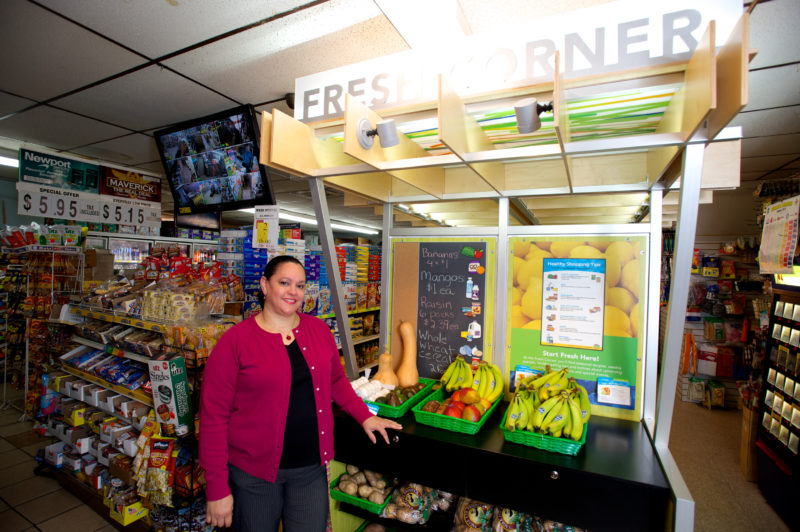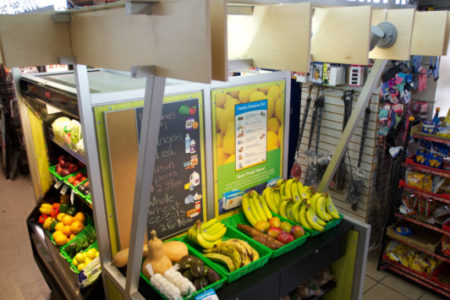
Share On Social!
About five years ago, Clara Santos opened Olivares Food Market to serve the Philadelphia neighborhood in which she lived.
Offering quick meals and grab-and-go snacks, her store was popular but had few healthy snacks. With some help from a food access organization, Santos learned that offering and promoting healthy food options is not only good for the health of her customers, but for business, too.
Junk Food in the Community
Awareness: Olivares Food Market, a corner store in South Philadelphia, owned by Clara Santos, is a lot like other similar markets in Philadelphia and across the country.
That is, it lacks healthy food options and has no marketing for the few it does have.
Olivares sells prepared foods—like high-calorie cheesesteaks for lunch and pancakes for breakfast—and typical junk-food snacks, like chips, candy, cookies, and sugary drinks. Limited fresh produce is available for cooking, like potatoes and lettuce.
Only a few lonely bananas are available for a healthy snack—and they’ve never been top sellers.
The Food Trust recognized an overall gap in healthy food access in urban Philadelphia. The Food Trust is a nonprofit that works with neighborhoods, schools, grocers, farmers, and policymakers to develop a comprehensive approach that combines nutrition education and greater availability of affordable, healthy food.
In 2004, the agency partnered with the Philadelphia Department of Health’s Get Healthy Philly initiative to pilot the Healthy Corner Store Initiative to motivate youth and adults to purchase healthier items through classroom education and direct marketing in the corner stores. The Philadelphia Healthy Corner Store Network (PHCSN) has expanded into over 600 stores in the city.
“We targeted Philadelphia neighborhoods with the lowest incomes from U.S. Census data because these neighborhoods suffer with the highest rates of obesity and diabetes and they also have low access to healthy foods,” said Kenji Tabery, project manager at The Food Trust.
Santos’ Olivares Food Market is in one of these neighborhoods.
Learn: A representative of The Food Trust team walked into Olivares Food Market in 2010.
The team goes out into these communities and asks corner store owners if they want to participate in the initiative for a healthy food marketing makeover.
The program is designed in four phases, each gradually increasing the level of participation for the corner store. Stores progress from a level of basic change, in which they introduce four new healthy products (Phase 1) and implement a Healthy Food Identification marketing campaign (Phase 2), to owner participation in training on business management and the profitable sale of healthy perishable foods (Phase 3). The highest level of change is a customized conversion to help expand a store’s inventory of healthy products (Phase 4).
Santos said the representative explained they wanted to help her sell healthier snacks.
But she was skeptical.
“I wasn’t very positive about it in the beginning,” Santos said.
Frame Issue: Santos wasn’t the only store owner in the program who was unsure about the program at first.
“Because it was so simple and low cost to them, we usually found the owners were maybe a bit skeptical, but wanted to try it out,” Tabery said.
Olivares Food Markets sits two blocks from a school, with students making up a large customer base.
Santos said she understood the need for healthier food options for her customers, but would a few new signs and some new food options actually get kids eating better and not hurt her bottom line?
Setting her doubts aside, Santos agreed to go ahead with the program, hoping her store could make a difference in her south Philly community.
“I decided to try. I thought it was good for my customers and the community to get more choices,” she said.
So Santos committed to the network and began Phase 1: inventory changes.
Addressing Junk Food in the Community
Education: Santos began buying and selling PHCSN-approved items, like whole grain bread and 100% juice.

Then she moved to Phase 2: promotion and marketing.
Before the marketing phase, Tabery said “it was difficult at first to attract customers to the healthy inventory.”
But when Santos installed new marketing signs outside and inside Olivares, alerting customers to the healthy food inside, people started trying new snacks.
Tabery said lack of skills and knowledge about how to buy and maintain healthy items, especially fresh produce, are large barriers to store owners’ ability to provide and maintain healthy options.
But that’s where The Food Trust can help, for Phase 3: education.
“Our staff go out and train the owners on how to increase their healthy inventory but also the salability of the healthy items,” Tabery said.
Store owners receive technical assistance in the form of trainings to educate the store owners about purchasing and maintaining fresh produce, tips on display and storage, and more.
Santos said these trainings were extremely helpful in helping her feel more confident in her ability to source, maintain, and promote her new fruits and vegetables.
Mobilization: Santos made it to Phase 4: receiving a fridge to stock her new perishable items, like fresh produce, low-fat dairy, and 100% juices.
Santos said she enjoys pointing customers to the fridge and chatting with them about eating healthy. When she sees a customer loading-up their coffee with sugar, she said she is always the first to say, “Are you sure you need that much?”
Debate: Most corner stores tend to pack a lot of food options into a small space, leaving stores crowded and cramped.
Santos’s store was no exception. She needed to rearrange some things if the new fridge was going to fit.
“Space is always an issue,” Tabery said.
He and his team work with store owners to improve the layout of the store, from deciding on the best spot for the refrigerator to moving healthy foods to areas with high visibility and foot traffic.
Enacting a Plan to Fight Junk Food in the Community
Activation/Frame: Tabery said that Santos has been open and enthusiastic throughout the initiative.
“She’s a wonderful store owner to work with,” he said.
Santos’ continued successes and commitment garnered her more trainings from PHSCSN and more confidence that adding healthy food options was good for business.
Another way the PHCSN ensures that the community benefits from the corner store makeover is through educational campaigns in schools and at community centers. Creating demand, as well as access, said Tabery, is how communities truly incorporate healthy eating into their everyday lives.
Santos said she began to look for others ways she could encourage customers, especially children, to eat healthier.
Change: Since joining the PHCSN, Santos has:
- Introduced fresh produce, fruit salads, low-fat milk and yogurt;
- Adjusted store inventory to prominently display healthy items throughout the store;
- Become certified by the city as “healthy”; and
- Added, through participation in PHCSN, a large, single-door refrigerator, a point-of-sales (POS) system, a showcase conversion kiosk, open air refrigerator, planters and exterior façade improvements.
In addition to these PHSCSN-related changes, Santos has taken it a step further. She has also implemented a healthy lunch special for students to pick up on their way to school.
“I charge them just the price for a hoagie, and I give them a bottle of water and a banana for free,” she said.
What started out as a corner store conversion ended up empowering Santos to make impactful, healthy changes all on her own.
Sustaining a Plan to Fight Junk Food in the Community
Implementation: At Olivares, the corner store marketing conversion has pushed fresh produce sales and water sales up almost 50%.
“I am very happy…all the changes in the store,” Santos said.
Remember those lonely bananas?
“Ever since she made these larger-scale changes…her banana sales have been at the top of the [top-seller] list consistently,” said Tabery.
Sustainability: Santos said her neighborhood is increasing. That means more customers for Santos and more opportunities to encourage them to eat healthy. She said that the young people in particular have been very appreciative of the fresh fruit and salad options, which bodes well for the health of the future generation.
And she still wants to do more.
Santos said she wants to pilot healthy fish tacos on her food menu. She plans to do a community taste testing where the neighborhood can come to Olivares and try out the new tacos themselves.
Some of Santos’ friends who own stores say they aren’t sure they want to work with the city or be bothered to make all the changes in their stores like she has.
But she encourages them to give it a try.
“Whenever I can talk about it, I tell them that it’s a good initiative and that they should participate,” she said.
Santos is proud to be able to offer her community choices that improve their quality of life.
“It’s part of me giving something back to the community,” she said.
Explore More:
Healthy FoodBy The Numbers
1
Supermarket
for every Latino neighborhood, compared to 3 for every non-Latino neighborhood
This success story was produced by Salud America! with support from the Robert Wood Johnson Foundation.
The stories are intended for educational and informative purposes. References to specific policymakers, individuals, schools, policies, or companies have been included solely to advance these purposes and do not constitute an endorsement, sponsorship, or recommendation. Stories are based on and told by real community members and are the opinions and views of the individuals whose stories are told. Organization and activities described were not supported by Salud America! or the Robert Wood Johnson Foundation and do not necessarily represent the views of Salud America! or the Robert Wood Johnson Foundation.



